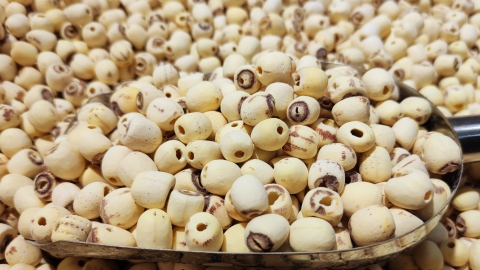What are the functions and effects of lotus seeds?
Generally speaking, as a common traditional Chinese medicine and food ingredient, lotus seeds have various functions and benefits, including spleen-strengthening and diarrhea-stopping, kidney-nourishing and essence-consolidating, calming the nerves and promoting sleep, moistening the lungs and relieving cough, and beautifying the skin. Detailed explanations are as follows:

1. Spleen-strengthening and diarrhea-stopping: Lotus seeds are sweet, astringent, and neutral in property, entering the spleen meridian. They can strengthen the spleen and are suitable for symptoms such as diarrhea caused by spleen deficiency, poor appetite, and loose stools. By invigorating the spleen and enhancing qi, they improve digestive and absorptive functions and help alleviate diarrhea caused by spleen deficiency.
2. Kidney-nourishing and essence-consolidating: Lotus seeds enter the kidney meridian and have the effect of nourishing the kidneys and consolidating essence. They are suitable for symptoms such as seminal emission, spermatorrhea, soreness and weakness of the waist and knees caused by kidney deficiency. By nourishing kidney essence and enhancing the kidney's containment function, they help stabilize the reproductive system and reduce abnormal loss of semen.
3. Calming the nerves and promoting sleep: The alkaloids in lotus seeds have a sedative effect, regulating the nervous system and reducing anxiety and irritability. They help improve insomnia, frequent dreams, and mental restlessness, promote deep sleep, and enhance mental well-being.
4. Moistening the lungs and relieving cough: Lotus seeds also help moisten the lungs and relieve cough, particularly effective in alleviating dry cough without phlegm or chronic cough. The mucilage and polysaccharides in lotus seeds can moisturize the lungs and relieve cough symptoms.
5. Beautifying the skin: Antioxidants in lotus seeds, such as vitamins C and E, as well as flavonoid compounds, can scavenge free radicals, slow down cellular aging, maintain skin elasticity and luster, thereby achieving the effect of beautifying the skin.
Although lotus seeds have multiple functions and benefits, it is important to consume them in moderation. Overconsumption may burden the gastrointestinal tract, causing indigestion, bloating, abdominal pain, and other discomforts. Additionally, individuals with constipation should avoid lotus seeds to prevent worsening symptoms. In daily life, lotus seeds can be consumed together with other ingredients—for example, cooking them with lily bulbs into a porridge—not only enhances the health benefits of lotus seeds but also provides a delicious and nutritious meal.





